|
|
|
Sort Order |
|
|
|
Items / Page
|
|
|
|
|
|
|
| Srl | Item |
| 1 |
ID:
130826
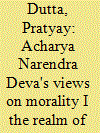

|
|
|
|
|
| Publication |
2014.
|
| Summary/Abstract |
Acharya Narendra Deva strongly believed that the Gandhian ideas based on morality and ethics could be the only solution to meet the basic needs of a society both developing and developed. It was thus that even after independence, he wielded the Gandhian weapon of Satyagraha most effectively to ?ght every form of injustice against the oppressed and the depressed in the then Indian society. Like Gandhi, he gave the highest priority for the removal of rural backwardness and he was in favour an innovative technology that could help in bringing an all round development in a developing society. He was a profound thinker who could analysis political, economic and social problems in their totality and his socio~political ideas about the solution to the problems facing the nation and society was exclusively original in its entirety. Narendra Deva accepted the value of morality and ethics of Gandhi and practised it fully throughout his whole life. It was Gandhi, who ?rst demonstrated the powerful effect on his countrymen of renouncing wealth for the sake of human service rather than personal salvation and Deva had trodden the same pathway into lndia's heart. Gandhi and Narendra Deva acquired their moral strength through renunciation, much as lndia's ancient sageswere supposed to obtain magical powers through their austerities. Their magic was singleness of purpose and an iron will. When Deva joined the Indian political
struggle under Gandhian leadership, the Mahatma once told him to simplify life and he took his words to heart. They never urged anyone else to follow their way of life and went their own way with a striking serenity. As a leading intellectual of outstanding mould, Acharya Narendra Deva had a forceful urge to bring about social justice, processed through a strong vein of idealism and always expressed deep concern for the down- trodden lndian masses. He remained a path?nder of the socialist movement in India and strongly believed that freedom was the first postulate for the establishment of the socialist society in India. He felt that without political independence the socialist programme could never become a reality. Narendra Deva always emphasized the moral and cultural elements of Marxism, but in the Indian socio-political context, he said that the class con?ict was already in existence and the real question was on whose side you were going to stand. Moreover, it was wrong to assume that the capitalist class had no vested interest in the freedom struggle. He, therefore, viewed that the socialists should create consciousness among labour, convince them that their interest would be well protected inn the freedom struggle and should broaden the base of that struggle by organizing the toilers. That is why; Gandhi and Deva wanted the historical stream of the cultural progress of India, in order to sustain the flow of continuity. In fact, Gandhi and Narendra Deva's entire socio-political ideas were ofa new social order purely based on universal love, ahimsa, morality and most importantly the role of ethics in Indian politics. Gandhi's ideal society was a non-violent and stateless society and repudiated state on ethical, historical and economic grounds. Unlike Marx, Gandhi and Deva persistently put emphasis on moral force and on the - realization of one's own self and there was no place for violence in their whole socio-political philosophy. The purpose ofthe article is to highlight the impact of ethics and morality on Narendra Deva's socio-political ideas and its relevance in the 21" century.
|
|
|
|
|
|
|
|
|
|
|
|
|
|
|
|
| 2 |
ID:
128562
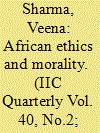

|
|
|
| 3 |
ID:
158103
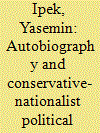

|
|
|
|
|
| Summary/Abstract |
This article examines how autobiography-writing evolved into a political space for Kazım Karabekir, Ali Fuat Cebesoy and Rauf Orbay, three major leaders of the Turkish War of Independence and the Progressive Republican Party. This article demonstrates that their autobiographies articulate a position of political opposition. This is a novel addition to academic literature that has so far presented these figures as early representatives of peripheral dissent against the Republic, or overstressed their Unionist legacy. The autobiographical politics of Karabekir, Cebesoy and Orbay extensively builds on moralizing discourses that contrast their own heroic accomplishments against the rise of a circle of military-bureaucratic elites – etraf – surrounding Mustafa Kemal Atatürk. Through textual analysis, this article maintains that the moralizing discourses they use pose a peculiar blend of nationalism and conservatism – an elitist conservative nationalism that homogenizes political differences and ideological splits. The analysis contributes to the study of Early Republican oppositional politics and conservative political imaginary in Turkey.
|
|
|
|
|
|
|
|
|
|
|
|
|
|
|
|
| 4 |
ID:
153017
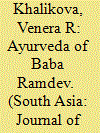

|
|
|
|
|
| Summary/Abstract |
This paper examines a cultural politics of nationalism and alternative medicine in India. It investigates the rhetoric of a popular guru, Ramdev, who criticises ‘the West’ and promotes ‘homegrown’ yoga and Ayurveda for strengthening individual bodies and the body of the nation. I argue that the expansion of the Ayurvedic market in India and Ramdev's personal success are both based on discourses that interweave a neo-liberal quest for health with nationalist sentiments and consumerist desires. I show how yoga and Ayurveda—situated within narratives of citizens’ duty to consume the homegrown—have become political tokens of national belonging and biomoral consumerism.
|
|
|
|
|
|
|
|
|
|
|
|
|
|
|
|
| 5 |
ID:
167060
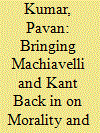

|
|
|
|
|
| Summary/Abstract |
This article is an attempt to understand the idea of morality in two of the most influential philosophers Niccolo Machiavelli (The Prince and Discourses) and Immanuel Kant (Perpetual Peace and Metaphysical Elements of Justice). Machiavelli and Kant are chosen because both of them are the most cherished philosophers in their fields. Machiavelli’s name is associated with realism, and he got a bad name because of his alleged cruel advice to maintain the state. His name is equalled with cunningness, murder, treachery. On the other hand, Kant is the founding figure of idealism in politics. His focus on categorical imperative and human capabilities to attain the higher moral goals made him one of the most well-known philosophers on idealism. To understand the ethical problems of the day emphasis is given to the classic writings of scholars who have written extensively on morality, justice, state, power, human rights and individual freedom. This article is an attempt to answer the following questions: Is the state in itself a highest moral actor? Can there be an individual morality above the state? What should be the yardstick to judge an act—the act in itself or the outcome of the act? What are the duties and rights of the individual in domestic society and can there be a similarity of morality at the level of political leaders in international politics? The paper argues that both Machiavelli and Kant were dealing with different contexts and societies, and morality for them had different meanings. However, the end justifies the means dictum is not the right way to understand Machiavelli on morality.
|
|
|
|
|
|
|
|
|
|
|
|
|
|
|
|
| 6 |
ID:
158941
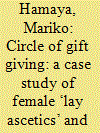

|
|
|
|
|
| Summary/Abstract |
This article investigates everyday practices of begging among female ‘lay ascetics’ in Haridwar, North India. The subject of female asceticism or renunciation in Hinduism has been far less examined than that of male renunciation. Recent feminist-conscious studies have pointed out that female ascetics are generally marginalized within, or completely excluded from, male-dominated ascetic communities, albeit some charismatic female gurus do manage to establish a measure of authority. But gender-based inequality is not the only form of inequality that matters here. This article explores the lives of female ‘lay ascetics’ who are regarded as neither authentic renouncers nor ordinary householders. While male ascetics are prioritized in receiving alms, most female ascetics must struggle to obtain alms through making use of their social networks. Female ascetics cooperate with each other in this for both their mutual advantage and for spiritual reasons. Yet serious competition over alms can and does arise, which can generate moral dilemmas and severe conflict. Through ethnographic descriptions of their gift exchanges, this article will clarify how female ascetics form social networks which are neither completely obligatory nor completely free.
|
|
|
|
|
|
|
|
|
|
|
|
|
|
|
|
| 7 |
ID:
176581
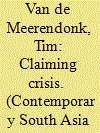

|
|
|
|
|
| Summary/Abstract |
This article discusses local expressions of crisis in Beed district, central Maharashtra. Both in public and academic discourse crisis has become the term of choice for the many structural deficiencies which make agriculture an increasingly precarious livelihood in India. While most voices subscribe to the explanation that the current state of distress can be attributed to the unprofitability of agriculture, a wide range of structural explanations are suggested as to why this might be the case. Consequently, in some debates agricultural crisis runs the risk of moving the experiences, agency and postionalities of those imagined to be living through its consequences to the background. This paper counterbalances such causal explanations by empirically delving into the imaginaries of agricultural crisis as they are articulated, negotiated and employed by farmers in Maharashtra. Based on twelve months of ethnographic research, the paper examines how ideas of crisis are entangled with colloquial understandings by taking experiences of ‘tension’, an Anglicised term used to express feelings akin to stress, as object of inquiry. I argue that by claiming crisis through invoking feelings of tension farmers mobilise a plurality of meanings, narratives and moral evaluations about what is wrong with agriculture in this part of India.
|
|
|
|
|
|
|
|
|
|
|
|
|
|
|
|
| 8 |
ID:
191035
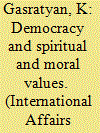

|
|
|
|
|
| Summary/Abstract |
THE development of democratic institutions has gone hand in hand with the evolution of human ideas about spiritual and moral values, natural rights, freedom, justice, and systems of government. It has also been simultaneous with the development of civil (written) law...
|
|
|
|
|
|
|
|
|
|
|
|
|
|
|
|
| 9 |
ID:
099815
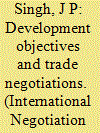

|
|
|
|
|
| Publication |
2010.
|
| Summary/Abstract |
To what extent do trade negotiations deliver on development objectives articulated from the developing world? In the past, the developed world deployed moralistic foreign policies and largesse to placate the developing world. The article examines the ways in which the global power configurations are now changing to allow developing countries to gain concessions instead through negotiations that are consistent with their development aspirations. It first provides a brief negotiation history of the developing world's relationship with the General Agreement on Tariffs and Trade (GATT) through the lens of development. The article then analyzes the intellectual property and agricultural negotiations at the current Doha Round of the World Trade Organization (WTO) to conclude that the developed world's preferred outcome remains moral largesse rather than making trade concessions.
|
|
|
|
|
|
|
|
|
|
|
|
|
|
|
|
| 10 |
ID:
130808
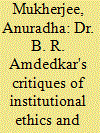

|
|
|
|
|
| Publication |
2014.
|
| Summary/Abstract |
Ethics and morality are the milestones of civilization in the true sense of the term. These concepts again are not static but evolve with greater implications and subtler nuances as humanity strives to grow towards perfection- the ultimate end of existence. ' whether biologically or spiritually. In the context of Indian thought, the traditional, age-old dictums of ethics and morality. having undergone numerous interpretations and changes have experienced a new set of values,' however latent in the traditional interpretation of Dharma or Niri- with the advent of" nationalism, the emergence of a new nation-state and the concurrent vision of human rights. The Constitution of India fully recognizes the moral as at par with the modem, that is, the western ideals of morality in the realization that in the context of Dalit uprising in modern India, the traditional ideals of ethics and morality are to be reviewed. Obviously this shows that what is legal should be ethical and moral or rather. what is ethical and moral tnust have its place in law. It is from this perspective that the modern-day Dalit struggle against injustices, age-old as they are. are to be seen and Dr.B.R. Ambedkar's initiation to this struggle was aimed at bringing ethics and morality to work at the state level, subjugating the Nili forest while lawgivers to take a backseat before the universal laws of morality. To understand Ambedkar's stand on the place of ethics and morality in Hinduism, one must see the reasons that made him strike out at the roots of Hindu social ethics. The Hindu social life was traditionally ruled by Dilemma. Dharma guided a Hindu's'Iife from birth to death by a set of rules strictly laid out for everyone in society. The observation of these rules was morality and the underlying ethics of these duties and rights was ?rst ofall, societal good, i.e., good for 'all. The second part of this ethics was that by observing this social morality, an individual will attain perfection. In accordance with these concepts, the Dharmas/zastras dictate the functions ofthe state and the king. The Nili and Dandanili emanate from one source and with one ideal- that is to maintain the social order by arranging for the speci?c duties of each and every member of society. Consequently. rights came as group rights and institutional rights as laid out in the Dharamshastra'. And over and above everything was the belief in the law of Karma that sanctified the rule of l/Z7I'l7aS/1I'uII7(l, or ones station in life as prescribed by onc's birth. These two essential features of Hindu society made it a highly stratified one so that the passage of' centuries only tightened the rules and the rituals pertaining to these two rules. The solemn and noble hymns of Rigveda. where the philosophy of Vedic seers and poets as the world being one and where everyone was the other's kin. I Va.t'zzdlmibu Kzzrumba/(um )' is the spirit of the ancient Indian Vedic realization. The utmost ideals of human dignity with the universal ethics of righteous behavior and the universal morality of conscientious behavior were preached in their fullest glory. . '
|
|
|
|
|
|
|
|
|
|
|
|
|
|
|
|
| 11 |
ID:
130825
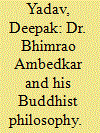

|
|
|
|
|
| Publication |
2014.
|
| Summary/Abstract |
Early Life
Bhimrao Ramji Ambedkar was born on I4 April 1891, popularly also known as Babasaheb, was an Indian jurist, politician, philosopher. anthropologist, historian and economist. A revivalist for Buddhism in India, he inspired the Modern Buddhist movement. As independent India's first law minister, he was the principal architect of the Constitution of India. Born into a poor Mahar family, Ambedkar campaigned against social discrimination, the Indian caste system. He converted himself to Buddhism and is also credited with providing a spark for the conversion of hundreds of thousands of lower caste members to Buddhism. Ambedkar was posthumously awarded the Bharat Ratna, India's highest civilian award, in 1990. Having earned a law degree and doctorates for his study and research in law, "economics and political science from Columbia University and the London School of Economics, Ambedkar gained high reputation as a scholar and practiced law for a few years, later campaigning by publishingjoumals advocating political rights and social freedom for India's untouchables. He is regarded as a Bodhisattva by some Indian Buddhists. though he never claimed it himself.
|
|
|
|
|
|
|
|
|
|
|
|
|
|
|
|
| 12 |
ID:
158579
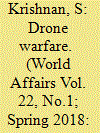

|
|
|
|
|
| Summary/Abstract |
S Krishnan details the justifi cations provided by the US for using drones even in areas where it is not formally at war and where such attacks are carried out by the CIA, a civilian agency. He avers that Washington is in breach of the laws of war, regardless of whether killing combatants by remote controlled weapons is morally acceptable and less likely to cause civilian casualties than conventional military action.
|
|
|
|
|
|
|
|
|
|
|
|
|
|
|
|
| 13 |
ID:
101298
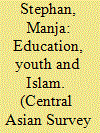

|
|
|
|
|
| Publication |
2010.
|
| Summary/Abstract |
This article attempts to explain the growing popularity of private religious lessons in urban Tajikistan from a cross-generational perspective. By instilling discipline and good 'morals', religious lessons serve as a powerful tool to socialize adolescent and morally vulnerable urban youth into the established social order. The increasing demand for religious instruction on the part of Muslim parents not only reflects the growing importance of Islam in Tajikistan, but also highlights the weaknesses of state education and the constraints on family upbringing in neo-local urban households. By attending religious classes, male and female youth have found a space for negotiating religious identities and for realizing their own abilities and ambitions. Given the socio-economic hardships of everyday life in the post-Soviet city, a turn to Islam can promote integration, recognition and social mobility, and offer an alternative route for urban youth to become 'adults'.
|
|
|
|
|
|
|
|
|
|
|
|
|
|
|
|
| 14 |
ID:
180004
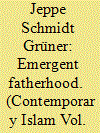

|
|
|
|
|
| Summary/Abstract |
This article explores how new practices and articulations of fatherhood are emerging
among Muslim men in Denmark. With an explicit focus on care as both practice and
ideal, the article accounts for the emergence of new forms of fatherly commitment,
intimacy, and caregiving in domestic life. Drawing on ethnographic material from
different social housing areas in and around the city of Copenhagen, I show how these
new practices and imaginaries of fatherhood are assemblages of both Islamic ethics and
values afforded by the Danish welfare state. Exploring the interlacement of care, Islam,
and fatherhood in Denmark, the article provides a nuanced perspective on the various
social roles of Muslim men as both fathers, sons, and husbands.
|
|
|
|
|
|
|
|
|
|
|
|
|
|
|
|
| 15 |
ID:
130802
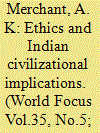

|
|
|
|
|
| Publication |
2014.
|
| Summary/Abstract |
The major civilizations of in human history have been associated with the major religious systems. Some
3,000 years ago Zoroastrianism was the religion of the "glory of ancient Persia," - the Persia that conquered" Babylon, Palestine, Egypt, and the Greek city-states. A few centuries later Judaism was the basis of Hebrew culture, which some philosophers such as Karl Jaspers regards as the greatest in history. And Jewish law has formed the I basis of common law and jurisprudence in countries all over the world. Western culture, until the rise of modem science, was dominated by Christianity. The teachings_ of Islam that burst upon world stage some 1400 years a go preserved and developed the Hellenistic heritage and gave algebra and other sciences. It was probably the greatest civilization the world had seen until the rise of the - Industrial Revolution began to transform Western culture. Today, the tumult of our age of transition is characteristic of the impetuosity and irrational instincts of youth. its follies, its prodigality, its pride, its self- assurance. its rebelliousness, and contempt of discipline.
|
|
|
|
|
|
|
|
|
|
|
|
|
|
|
|
| 16 |
ID:
130787
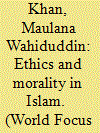

|
|
|
|
|
| Publication |
2014.
|
| Summary/Abstract |
The concept of human values is by its very nature universal. That is why we find uniformity in the teachings on human values in all religions. If there are any differences on this subject, they relate to points of reference, i.e. to religious books, rather than to the human values themselves.
|
|
|
|
|
|
|
|
|
|
|
|
|
|
|
|
| 17 |
ID:
118322
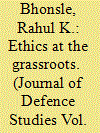

|
|
|
|
|
| Publication |
2013.
|
| Summary/Abstract |
This article addresses the declining standards of morality in the armed forces and suggests measures to address it by undertaking appropriate interventions at the grassroots, unit or battalion. It traces the importance of ethics in the military, particularly in the context of the post-modern state, which grants exclusive authority to the armed forces for the use of violence. Further, it examines the state of ethics today and the challenges in codification to arrive at the basic ethical norms that need to be fostered in the military. Having established this, the article goes on to highlight the context of ethics at the unit level, outlining the challenges faced, including in counter-insurgency operations, normal administrative functioning, and the current approach to ethics training. The author proposes three options as suggestions for building an ethical culture in the unit-the Kohlberg model, the Values and Virtues Approach, and a Code of Conduct.
|
|
|
|
|
|
|
|
|
|
|
|
|
|
|
|
| 18 |
ID:
130789
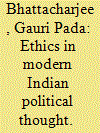

|
|
|
|
|
| Publication |
2014.
|
| Summary/Abstract |
Political _thought is concerned with the state, and the sovereign power of the state is legally unlimited, though it is not arbitrary. It is exercised with the objective of realizing some interest of the state. With the rise of the concept of democracy there arose, not only the importance of the individual but also the long struggle between state sovereignty on the one hand, and individual freedom on the other, ultimately giving rise to the concept of democracy. Democracy does not mean s-imply majority rule. It implies majority rule with full rights of all. The simple view of majority rule gave rise to the misleading concept of democratic dictatorship, and in a democracy an individual, even if he becomes a minority of one, is entitled to enjoy all the rights embodied in the constitution. Democracy therefore implies rights of all and rule by the majority opinion as ascertained periodically.
|
|
|
|
|
|
|
|
|
|
|
|
|
|
|
|
| 19 |
ID:
130822
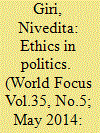

|
|
|
|
|
| Publication |
2014.
|
| Summary/Abstract |
Till recently when India passed through its l6th general Elections, the election Commission of India appealed Indian citizens to select candidates and dump the criminals and the corrupt ones. It also urged the voters to sign a pledge to be ethical while casting their votes in the coming Lok Sabha elections. The Election Commission also appealed the voters to cast their votes without fear or greed, and without keeping caste, religion and creed consideration in mind. The commission's letter also stated that electing a candidate is not merely a citizen's right but his/her responsibility. Ethics and morality have been the hallmark of public life in India since ancient times. Rulers were expected to observe stricter ethical values. Ethics and politics, in other words, were inseparable. This ethical and moral legacy was inherited by its national leaders, who demonstrated a high degree of probity and honesty in public life during the freedom struggle. The early national leaders and political philosophers believed that politics without morality is a thing to be voided. However, in recent years there is a general feeling that all is not well with the Indian political system which is functioning under great strain. It has been noticed and concerns are being expressed over the general decline of values in public life. Recent trends in politics, however, appear to have created an impression as if, the capacity of Indian democratic system to ensure integrity in public life is increasingly going down.
|
|
|
|
|
|
|
|
|
|
|
|
|
|
|
|
| 20 |
ID:
126042
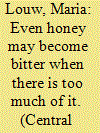

|
|
|
|
|
| Publication |
2013.
|
| Summary/Abstract |
In Kyrgyzstan, as in the rest of Central Asia, recent decades have witnessed a proliferation of distinctions between 'good' and 'bad' Islam. What is perceived as a growing 'religiosity' is often seen as a symptom of post-Soviet chaos and excess, but people equally tend to see Islam as an important source of well-being, for themselves and for society as such. It is argued that a general feature of the Islam many Muslims strive for - and occasionally experience glimpses of - is one that expresses, embodies and enables a balanced existence: a balance between well-being in this world and in the afterlife; a balance between the acceptance of one's fate and the attempt to improve one's situation; or a balance between adherence to abstract dogmas and respect for local moralities.
|
|
|
|
|
|
|
|
|
|
|
|
|
|
|
|
|
|
|
|
|